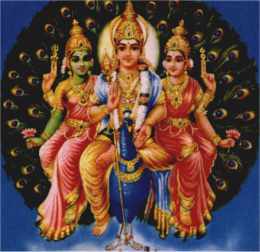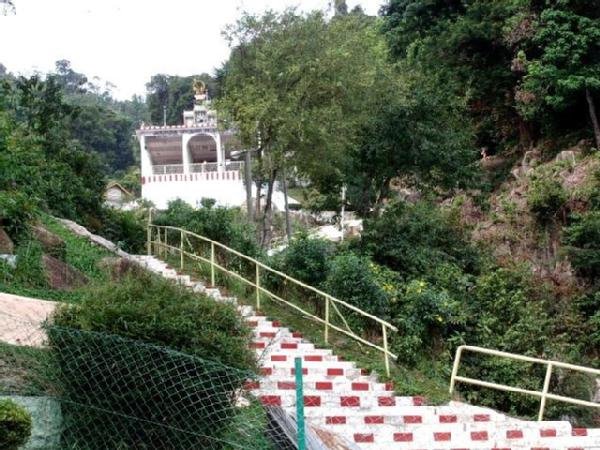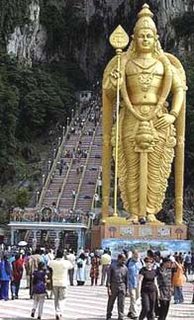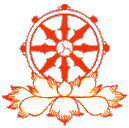Thursday, February 16, 2006
Thaipusam to a non-Hindu Penangite
 Lord Muruga, His Consorts, His Divine Spear & His Vehicle; The Peacock
Lord Muruga, His Consorts, His Divine Spear & His Vehicle; The Peacock  Hilltop Murugan Temple At Waterfall, Penang.
Hilltop Murugan Temple At Waterfall, Penang.

The silver chariot bearing Lord Muruga's image on procession from Kovilvedu, Market Street to Nattukotai Chettiar Temple, Waterfall on Thaipusam Eve.
 A closer view of Lord Muruga's image on the chariot
A closer view of Lord Muruga's image on the chariot
I'm a 3rd generation Chinese from Penang. Come Thaipusam each year, my family never fail to turn up to pay homage to Lord Muruga in the Waterfall temple. One can see from the crowd of devotees at Waterfall, almost half of it consists of local Chinese!

Their devotion to Lord Muruga can be traced back to one or two generations ago. My late grandmother knew about Lord Muruga when she was in her late 30's (1940's). She fondly referred to Lord Muruga as 'Ti Ti Ang Kong' , ('Ti Ti' being a corrupted version of the local Chinese pronunciation of Chetiar, and 'Ang Kong' which means God) God of the Chetiars. Her faith in Lord Muruga was passed down to my parents, and they in turn passed it on to me.
This is generally how the Chinese in Penang come to syncretise Lord Muruga into their faith. The Chinese devotees may not know much about Thaipusam or Lord Muruga when compared to their Hindu friends save testimonials of blessings but their devotion is at par with the rest of their Hindu friends.
This Article Was Posted on : 14-Feb-2006 (In Star Online Citizen's blog)
Choice of words
I can see why these words are used on Eastern subjects : the writers being Western most probably bear the Christian ‘we’re the light of the world’ attitude and all traditions outside the Church and its teachings are all false. Thus, such words are used to show their objection to such ‘paganistic’ practises in a subtle approach. We, the British’s former colony follow them blindly in subtly ridiculing what we cherish as a set of belief.
I read with deep remorse an article in a college’s Chinese New Year Nite’s exhibition bearing the title “Chinese Superstitions.” I take this matter seriously as I feel the word ‘superstition’ belittles what the Chinese believe.
The first question I would like to ask the organisers is whether they consider themselves Chinese or not and secondly whether they are proud or ashamed of their very own system of belief. By connecting the Chinese belief to superstition, it can mean the Chinese belief system is no more than just a fairytale! That, to me is indeed unacceptable!
The organisers may not intend to belittle the Chinese system of belief. The word has long been used too complacently in books on Eastern culture and religion. Well, realising the Western writer’s folly, let us wake up on our choice of words to describe our culture and religion.
Use strong words like ‘BELIEF’ and ‘HISTORY.’ Rather than writing Chinese superstition or Chinese myth, do write Chinese belief or Chinese history. It does indeed sound better!
